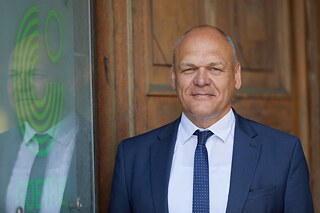Johannes Ebert
Secretary General
Biography
Born in Ulm in 1963
married
three children
Short Biography
Johannes Ebert has been General Secretary and Chairman of the Goethe-Institut since 2012. He studied Islamic scholarship and scientific politics in Freiburg and Damascus. He then trained as a journalist in Heilbronn. After appointments as a teacher for the Goethe-Institut in Prien, language course consultant at the Goethe-Institut in Riga and deputy director of the public relations department at the Munich headquarters, he became director of the Goethe-Institut in Kiev from 1997 to 2002. From 2002 to 2007 he was head of the Goethe-Institut in Cairo and the North Africa/Middle East region. From 2007 to 2012 he was director of the Goethe-Institut in Moscow and the Eastern Europe/Central Asia region. In addition to fostering European cooperation and integration, Johannes Ebert's work focuses on increased engagement in crisis regions and countries undergoing upheavals such as Ukraine, North Africa and the Middle East. He is particularly concerned to support refugees in the countries that border Syria and in Germany with cultural and educational projects. For many years he has also been campaigning for the expansion of digital programmes within Germany’s foreign cultural and educational policy (AKBP) and the incorporation of global debates in Germany.

- 1982 – 1988 Student of Islamic studies (Arabic, Persian, Turkish) and Political Science in Freiburg im Breisgau
- 1984 – 1985 Year’s scholarship from the DAAD in Damascus to study the Arabic language
- 1990 – 1991 Editorial traineeship at the newspaper Heilbronner Stimme
- 1991 – 1993 Trained as a Goethe-Institut instructor in Munich, Prien, Abidjan (Cote d’Ivoire)
- 1993 – 1994 Goethe-Institut instructor (teacher of German as a foreign language) at the Goethe-Institut Prien
- 1994 – 1995 Language course consultant at the Goethe-Institut Riga (Latvia)
- 1995 – 1997 Deputy head of the Public Relations division at the Munich head office of the Goethe-Institut
- 1997 – 2002 Director of the Goethe-Institut Kiev (Ukraine)
- 2002 – 2007 Director of the Goethe-Institut Cairo/Alexandria (Egypt) and Goethe-Institut Regional Director Middle East/North Africa
- 2007 – 2012 Director of the Goethe-Institut Moscow (Russia) and Goethe-Institut Regional Director Eastern Europe/Central Asia
- since 1 March 2012 Secretary-General of the Goethe-Institut
Johannes Ebert is member of the Foundation Council of the Japanese-German Center Berlin, member of the Academy Advisory Board of the Tarabya Cultural Academy and member of the Advisory Board of the German-Turkish Youth Bridge. In addition, he is member of the Executive Committee of the German Academic Exchange Service, member of the Board of Trustees of the International Youth Library Foundation, member of the Board of Trustees of the Villa Aurora & Thomas Mann House e.V. and member of the Board of Trustees of the DFB Cultural Foundation. Johannes Ebert was elected Vice-President of the EU National Institutes for Culture (EUNIC) at their annual general meeting on 11 June 2021. He will accede to the office of President from June 2022 onwards.
Publications
Publications (selection, only available in German) (status: May 2022)
- Ebert, Johannes: Freier leben – weltweit. In: Bernecker, Roland, Ronald Grätz (Hrsg.): Kultur und Freiheit – Beschreibung einer Krise, Steidl, 2021
- Ebert, Johannes: Die AKBP ist ein multipolares Geflecht - Einige Gedanken zur Verschmelzung von Innen und Außen in der Kulturpolitik und zur Rolle des Goethe-Instituts. In: Grätz, Ronald, Markus Hilgert (Hrsg.): Innenkulturpolitik – Außenkulturpolitik. Perspektiven gemeinsamen Handelns, 2021
- Ebert, Johannes, Olaf Zimmermann, u. a. (Hrsg.): AKBP - Auswärtige Kultur- und Bildungspolitik: Ein Rückblick zu Ehren von Klaus-Dieter Lehmann, Deutscher Kulturrat, 2020.
- Ebert, Johannes, Ronald Grätz: Die Chancen der Auswärtigen Kultur- und Bildungspolitik. In: Mair, Stefan, Dirk Messner und Lutz Meyer (Hrsg.): Deutschland und die Welt 2030, 2018.
- Ebert, Johannes u. a. (Hrsg.): Teilen und Tauschen, S. Fischer Verlage, 2017.
- Ebert, Johannes u. a. (Hrsg.): Klima.Kunst.Kultur. Der Klimawandel in Kunst und Kulturwissenschaften, 2014.
- Ebert, Johannes u. a. (Hrsg.): Menschenrechte und Kultur. Das Menschenrecht auf Kultur, 2014.
- Ebert, Johannes u. a. (Hrsg.): Positionen 7: Zeitgenössische Künstler Arabische Welt, 2013.
- Ebert, Johannes: Starke Strukturen, kreative Ansätze und große Aufgaben in der Zukunft. Die Förderung der deutschen Sprache durch das Goethe-Institut in Russland. In: Ammon, Ulrich/Kemper, Dirk (Hrsg.): Die deutsche Sprache in Russland. Geschichte, Gegenwart, Zukunftsperspektiven, 2011.
- Ebert, Johannes (Hrsg.): MIDAD – das deutsch-arabische Stadtschreiberprojekt. Mit Vorworten von Jutta Limbach und Mahmoud Darwisch und Beiträgen von Thomas Brussig, Steffen Kopetzky, Silke Scheuermann, Akram Mussallam, Latifa Baqa u. a., 2007.
- Ebert, Johannes: „Kulturdialog mit der arabischen Welt – Chance für Austausch und Annäherung.“ In: Qantara.de, 2007.
- Ebert, Johannes: Unity in Diversity: Who is doing What in German Educational and Cultural Politics Abroad? In: Warner, Nils (Hrsg.): Mediterranean Sea – Gap or Bridge?, 2006